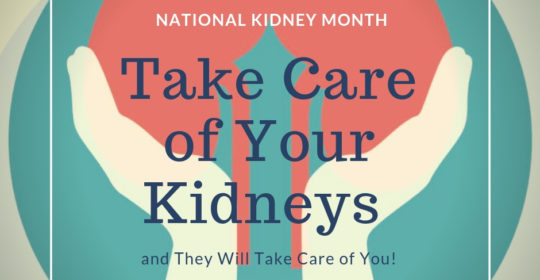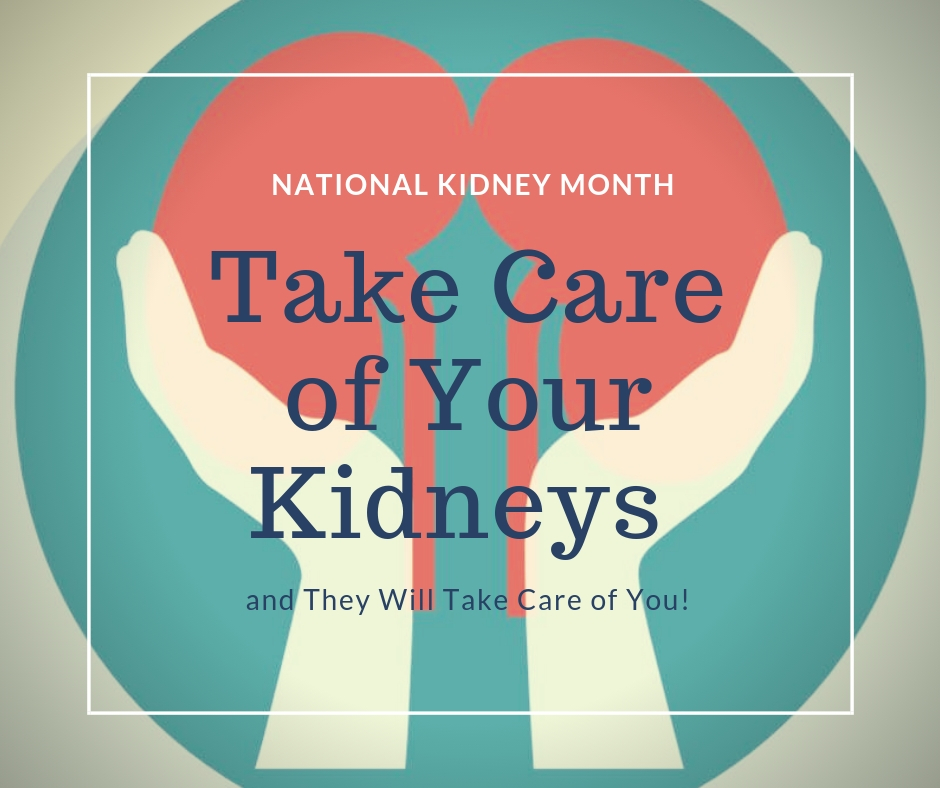
Take Care of Your Kidneys and They Will Take Care of You

Your kidneys, each just the size of a computer mouse, filter all the blood in your body every 30 minutes. They work hard to remove wastes, toxins, and excess fluid. They also help control blood pressure, stimulate production of red blood cells, keep your bones healthy, and regulate blood chemicals that are essential to life. Kidneys that function properly are critical for maintaining good health, however, more than one in seven American adults are estimated to have chronic kidney disease (CKD).
Chronic kidney disease is a condition in which the kidneys are damaged and cannot filter blood as well as they should. Because of this, excess fluid and waste from blood remain in the body and may cause other health problems, such as heart disease and stroke.
Some other health consequences of CKD include:
- Anemia or low number of red blood cells
- Increased occurrence of infections
- Low calcium levels, high potassium levels, and high phosphorus levels in the blood
- Loss of appetite or eating less
- Depression or lower quality of life
CKD has varying levels of seriousness. It usually gets worse over time though treatment has been shown to slow progression. If left untreated, CKD can progress to kidney failure and early cardiovascular disease.
Who is More Likely to Develop Kidney Disease?
- Approximately 1 of 3 adults with diabetes and 1 of 5 adults with high blood pressure may have CKD.
- In addition to diabetes and high blood pressure, other problems that put you at greater chance of kidney disease include: heart disease, obesity (being overweight), and a family history of CKD. Kidney infections and a physical injury can also cause kidney disease.
How Will You Know If You Have Kidney Problems?
- Ask your doctor to test your blood and your pee.
- If the doctor finds protein (albumin) in your pee, it is a sign of the start of kidney disease caused by diabetes.
- If you have diabetes, get tested yearly.
- Get tested more often if:
- Your test shows protein in your pee or;
- Your kidneys are not working as they usually do.

What Can You Do to Prevent Kidney Failure?
- Get tested for CKD regularly if you are at risk.
- Find it early. Treat it early.
- Ask your doctor to test your blood or pee. If you have diabetes, get tested yearly.
- If you have diabetes, stay in your target blood sugar range as much as possible.
- Lose weight if you are overweight.
- Get active. Physical activity helps control blood sugar levels.
- Quit smoking.
- Getting a checkup? Make sure to get your kidneys checked too.
- Take medications as directed.
- If you have CKD, meet with a dietitian to make a kidney-healthy eating plan.
What is the Best Way to Keep Your Kidneys Healthy?
- Keep your blood pressure below 140/90, or ask your doctor what the best blood pressure target is for you.
- Stay in your target cholesterol range.
- Eat foods lower in salt.
- Eat more fruits and vegetables.
- Take your medications as directed.
If You Have Diabetes, Take These Steps:
- Meet blood sugar targets as often as you can.
- Get tested for your average level of blood sugar over the past three months (A1C test).
- Get your A1C test at least twice a year, but ideally up to four times a year.
- If your blood pressure is high, check it regularly and get it under control to make sure your kidneys stay healthy.
- Talk to your doctor about medicines that harm your kidneys and other ways to lower your blood pressure.
Source:
CDC


Most Commented